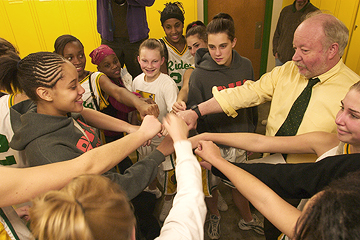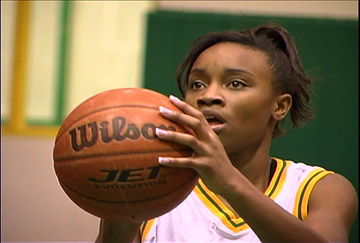The Heart of the Game


Most sports documentaries follow a team over one year, and usually have the luck of choosing a pivotal year to film. Ward Serrill's The Heart of the Game follows the Roosevelt Roughriders over seven years. Serrill was probably thinking of Hoop Dreams as he followed the Roughriders, and in particular, coach Bill Resler and star player Darnellia Russell, but the movie fails to capture the emotion that it should, and tends to meander when it should soar.
Resler was an interesting choice, and it was easy to see why Serrill chose to begin filming him. Resler is a tax professor at the University of Washington who had no previous coaching experience, except for personally coaching his three daughters. He had some very unconventional ways of motivating his students, including having them imagine themselves a wolf pack, attacking and killing their opponents. Yet, Resler manages to energize a sleepy program at Roosevelt, leading to a nearly lossless season.
Serrill then intertwines Resler's story with that of Russell. Russell was a basketball phenomenon who went to Roosevelt to help improve her grades and chances of succeeding off the court. She had real talent, but also had a difficult time adjusting. Most of her friends with to Garfield, the local rival. Roosevelt was Russell's first time amongst a majority Caucasian population, which intimidated her. Poor academics also forced her to stay on the bench for the opening games of two seasons.
As the years pass, Roosevelt continues to garner wins, and Russell's fame continues to rise. But here is where Serrill goes a little off track. The one disadvantage to filming for so many years is that too many things happen. The Heart of the Game has a very unfocused feeling to it. Players come and go, and Resler gives a little time to each of them. He also spends time interviewing Garfield coach and local legend Joyce Walker. Doing this may be interesting, but it takes time away from Russell, who becomes pregnant near the end of her junior year. Serrill devotes some time to this issue, but everything feels so superficial. He also makes the mistake of trying too hard. A surprising number of games are determined in the final minutes, and Serrill milks the suspense too often, too unnecessarily. And while Resler has a larger-than-life personality, there is scant little time devoted to the coach/athlete relationship between him and Russell. It's a shame, since the story here is so heartwarming, and Serrill only manages to make it seem a bit so